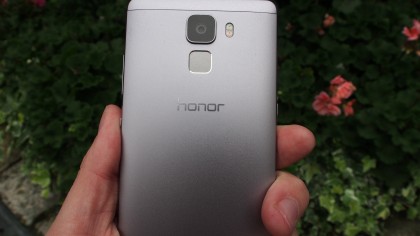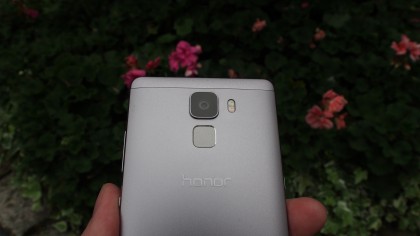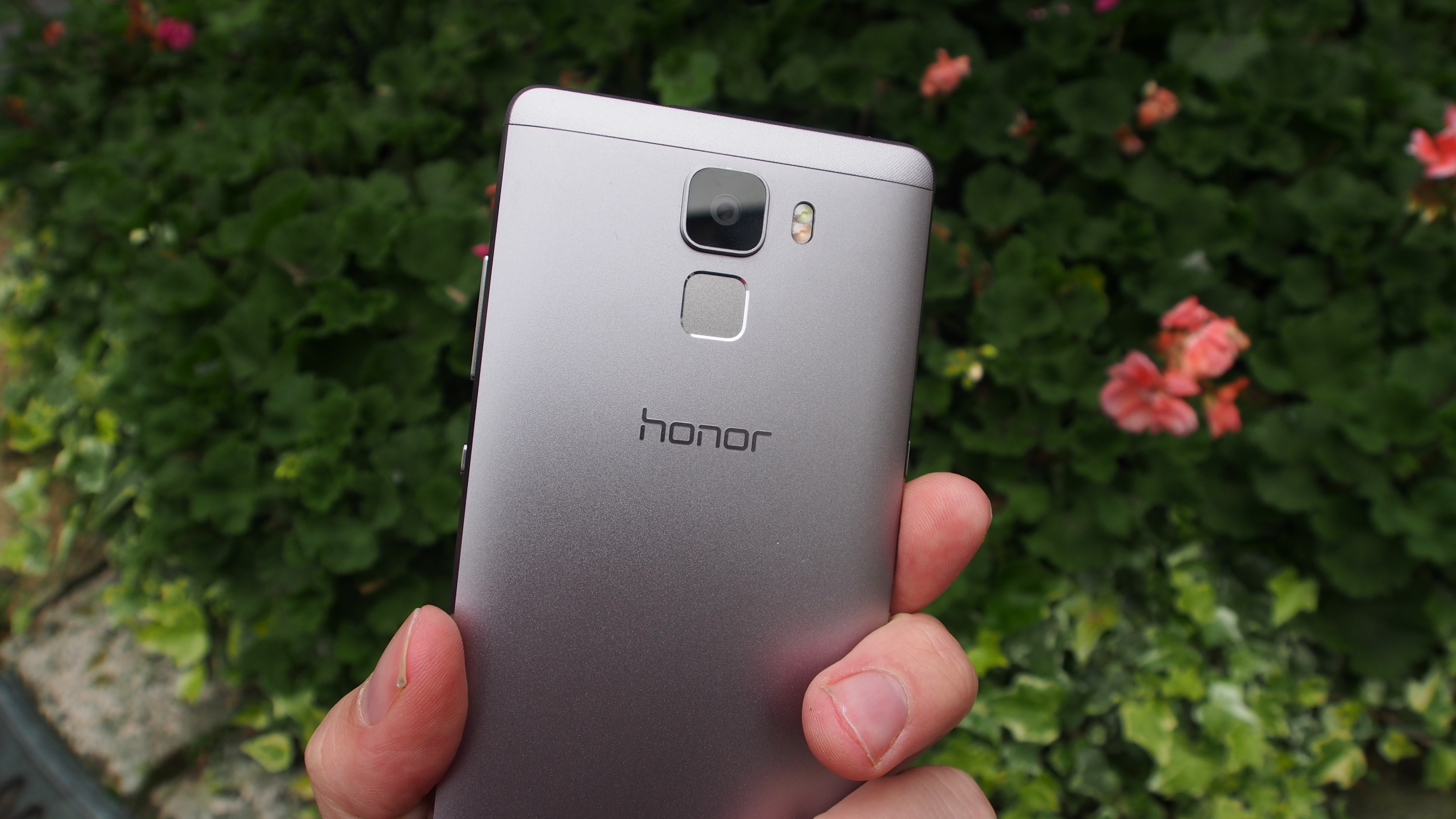Why you can trust TechRadar
Unlocking with a fingerprint
The Huawei Honor 7 is one of a growing number of handsets that include biometric sensors, enabling you to securely unlock the smartphone with your fingerprint.
The feature is great in theory, as it combines improved security (people are less likely to spoof your fingerprint then crack your pin code), with ease and convenience.
Although it's good to see such advanced features appear on more affordable phones, unfortunately the fingerprint scanning implementation on the Honor 7 is a bit hit and miss.

First the good news: the fingerprint scanner is located on the back of the Honor 7, just below the rear camera, and this position makes it easy to reach when you're using the phone with one hand.
I found that my finger naturally fell on the fingerprint scanner when I picked it up, which meant that when the scanning worked, the Honor 7 was unlocked and ready to use before I even knew it.
Another plus point is that configuring the fingerprint scanner is straightforward, with easy-to-follow instructions on how to register your fingerprint. You can register a number of fingerprints as well, which is useful if you share your phone with your partner.
The fingerprint sensor vibrates when touched, with gives helpful feedback when using the feature, and it can also register gestures, such as a swipe down with a finger to bring down the top menu – it's a nice touch for accessing it with one hand, although you'll need the other hand to select the options from the menu anyway.
Sign up for breaking news, reviews, opinion, top tech deals, and more.
However, there are issues with the sensor as well. For fingerprint scanning to be really easy and convenient it has to work flawlessly and consistently, and unfortunately the Honor 7's fingerprint scanner falls short.
Despite the ease of registering my fingerprint, when I tried to use it to unlock the phone I was repeatedly told that the fingerprint wasn't being recognised, so I went back and recalibrated the sensor.
The second time it worked much better, but frustratingly it still refused to register my fingerprint on occasion. This meant that sometimes I'd pick up the phone, press my finger on the sensor and all was well with the world; other times I'd keep on trying until the Honor 7 gave me a 30-second timeout, forcing me to enter my PIN as normal.
Sadly, for an easier life it meant that I got into the mindset that I'd have to use my PIN to unlock the phone and not depend on the flakiness of the fingerprint scanner. It's a real shame, as this was one of the features I was looking forward to most, but its unreliability means that you'll probably end up unlocking the Honor 7 the old fashioned way more often than not.
The gesture recognition of the sensor was equally spotty, with it sometimes working fine, and other times not working at all.
Voice control
In a world with Google Now, Siri and Cortana, voice control isn't that revolutionary, but I still have to give props to Huawei for giving it a shot with its own implementation – especially considering that it doesn't have the resources of Google, Apple or Microsoft.
When setting up the phone you can turn on 'Voice Wake Up', which enables you to find a misplaced Honor 7 by using your voice. Before using the feature (which can only be used in English, but gives you the option of US, British and Australian variants) you have to utter the phrase "Dear Honor" a few times for it to calibrate, while trying to avoid the bemused stares of anyone within earshot.
Once this has been done the Honor 7 continually listens out for the "Dear Honor" command, with all the pros and cons that entails.
So, it means that if you've misplaced your Honor 7 you can walk around where you think you last left it saying "Dear Honor, where are you?". If it hears your pleas it will say it's nearby, and will play sounds and flash lights as well, which is actually pretty handy. If it's not nearby, however, you've not only lost your phone but potentially your dignity too.
However, the fact that it's continually listening to you also means the Honor 7 is prone to interrupting conversations. A number of times I was speaking to someone only for the Honor 7 to butt in, asking me which contact I wanted to ring. Sometimes it would interject with a huffy "I didn't understand that. Goodbye" as well. As far as I'm aware none of the conversations I was having before the Honor 7 joined in used the words "honour" or "dear".
So – and this is starting to look like something of a recurring theme – the voice activation feature has some nice ideas but is let down by the way it's implemented, resulting in an inconsistent overall experience.
20-megapixel camera
The Honor 7's big selling point is that it has a good set of specs considering its price, and if there's one bit of hardware that will make you sit up and take notice it's the 20-megapixel rear camera.
This is a fair bit more capable than the Motorola Moto G (2015)'s 13MP snapper, while the Meizu M2 Note, another competitor of the Honor 7, also has a 13MP camera.
Of course, more megapixels does not automatically mean better pictures, but if you use your smartphone for regularly taking snaps then the Honor 7's camera could be a deciding factor if you're thinking of taking the plunge.

I'll go into more depth about whether or not the camera lives up to expectations later on in this review, but it looks like mid-range smartphones will have to up their game in the camera spec war if they want to remain competitive.

Matt is TechRadar's Managing Editor for Core Tech, looking after computing and mobile technology. Having written for a number of publications such as PC Plus, PC Format, T3 and Linux Format, there's no aspect of technology that Matt isn't passionate about, especially computing and PC gaming. He’s personally reviewed and used most of the laptops in our best laptops guide - and since joining TechRadar in 2014, he's reviewed over 250 laptops and computing accessories personally.
